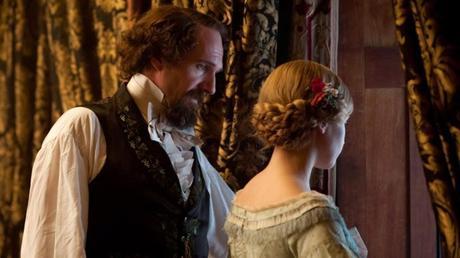 Directed and starringRalph Fiennes as Charles Dickens, THE INVISIBLE WOMAN is the latest period movie I saw. It is an adaptation ofClaire Tomaline's book of the same name. It was released in 2013, it hasn’t made it to Italian theatres so far, but it is fortunately already available on DVD. The invisible woman of the title is Ellen Ternan , played by Felicity Jones, seen as Catherine Morland in Northanger Abbey 2007 or more recently in Hysteria. Ellen, Nelly, was a beautiful young actress with whom Charles Dickens had a secret 13-year affair and who was 27 years his junior. Abi Morgan (Shame) adapted Claire Tomalin‘s novel. Tom Hollander , as the author Wilkie Collins, Kristin Scott Thomas, as Nelly's mother, Tom Burke (The Musketeers) as Ellen’s husband, George Robinson, are also in the cast.
Directed and starringRalph Fiennes as Charles Dickens, THE INVISIBLE WOMAN is the latest period movie I saw. It is an adaptation ofClaire Tomaline's book of the same name. It was released in 2013, it hasn’t made it to Italian theatres so far, but it is fortunately already available on DVD. The invisible woman of the title is Ellen Ternan , played by Felicity Jones, seen as Catherine Morland in Northanger Abbey 2007 or more recently in Hysteria. Ellen, Nelly, was a beautiful young actress with whom Charles Dickens had a secret 13-year affair and who was 27 years his junior. Abi Morgan (Shame) adapted Claire Tomalin‘s novel. Tom Hollander , as the author Wilkie Collins, Kristin Scott Thomas, as Nelly's mother, Tom Burke (The Musketeers) as Ellen’s husband, George Robinson, are also in the cast.Official synopsis
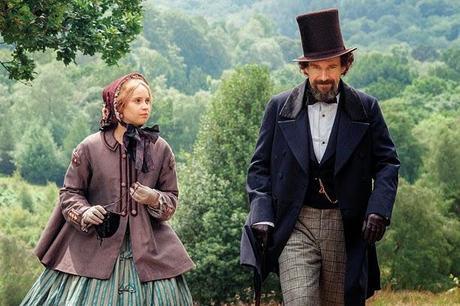
Nelly, married and mother of children is tormented by her past. Her memories, brought about by her sense of guilt and regret, lead the story back in time in order to explore her affair with Charles Dickens, which was exciting and fragile at the same time. Dickens falls in love with her. The young woman comes from a family of actors and the theater is crucial for both of them and for their relationship. Nelly becomes his muse, but the price they pay is a complex, very secret relationship for which the Nelly will be condemned to become an invisible woman.
The real story
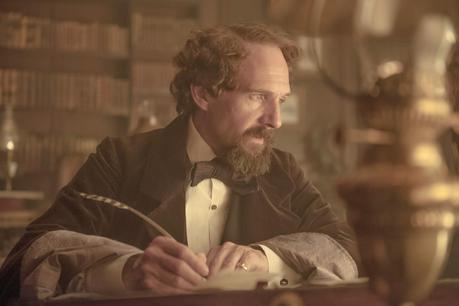 Dickens was forty-five when he met Nelly (Ellen) Ternan, and she was only eighteen, slightly older than his daughter Katey. Dickens became passionately attached to her, but their relationship had to be kept secret from the general public. Victorian middle class pruderie wouldn't forgive Dickens such an immoral behavior. Dickens himself would have condemned his behavior in one of his novels.
Dickens was forty-five when he met Nelly (Ellen) Ternan, and she was only eighteen, slightly older than his daughter Katey. Dickens became passionately attached to her, but their relationship had to be kept secret from the general public. Victorian middle class pruderie wouldn't forgive Dickens such an immoral behavior. Dickens himself would have condemned his behavior in one of his novels. I think modern readers should be less shocked by Dickens's having had a mistress, than by his determination to keep everything secret, a determination which led even to cruelties towards his wife and children. According to Dickens, his wife lacked his energy and intellect, while Nelly Ternan, in contrast, was clever and charming, interested in literature, the theatre, politics. Dickens referred to Ternan as his"magic circle of one". The situation came to a head in 1858 when Catherine, Dickens's wife, found and opened a packet delivered by a London jeweller which contained a gold bracelet meant for Nelly with a note written by her husband. The Dickenses separated that May 1858 after 22 years of marriage.
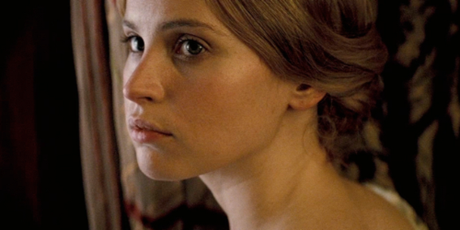
My musings
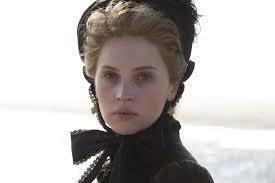 My little sympathy for the man is usually balanced by the great admiration for the artist, when it comes to Charles Dickens. As for this movie, all my sympathy went to Nelly and to her suffering. I can’t agree with all her choices, anyway I can’t deny her my compassion. She was maybe greatly loved by a great man, but couldn’t be for him - and for the rest of the world - more than an invisible woman, a shadow. When Dickens was in her life, she had to see him in secret and never show her feelings publicly. She had to cope with her sense of guilt and could never fully be happy. When he died, she couldn’t mourn him openly and, worse than that, though she had stopped being an actress on stage, she had to go on pretending and playing a role all her life through: the dutiful wife and mother, Mrs Robinson. Furthermore, her sense of guilt never stopped haunting her. The movie focuses on torn Nelly and on the difficult choices she had to make. The story starts several years after Dickens’s death.Her sorrow is turned to recklessness, a torment we can share and witness from the opening scenes of the movie: she nervously walks on a solitary beach, she comes back home, after long absence, where she’s expected to direct a group of kids in a pantomime, including her own son, but her mind is elsewhere and she is evidently torn and restless.
My little sympathy for the man is usually balanced by the great admiration for the artist, when it comes to Charles Dickens. As for this movie, all my sympathy went to Nelly and to her suffering. I can’t agree with all her choices, anyway I can’t deny her my compassion. She was maybe greatly loved by a great man, but couldn’t be for him - and for the rest of the world - more than an invisible woman, a shadow. When Dickens was in her life, she had to see him in secret and never show her feelings publicly. She had to cope with her sense of guilt and could never fully be happy. When he died, she couldn’t mourn him openly and, worse than that, though she had stopped being an actress on stage, she had to go on pretending and playing a role all her life through: the dutiful wife and mother, Mrs Robinson. Furthermore, her sense of guilt never stopped haunting her. The movie focuses on torn Nelly and on the difficult choices she had to make. The story starts several years after Dickens’s death.Her sorrow is turned to recklessness, a torment we can share and witness from the opening scenes of the movie: she nervously walks on a solitary beach, she comes back home, after long absence, where she’s expected to direct a group of kids in a pantomime, including her own son, but her mind is elsewhere and she is evidently torn and restless. 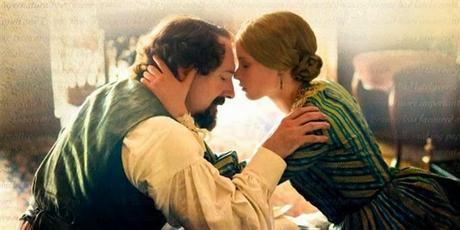
Felicity Jones’s portrait of Nelly is convincing and gripping. Ralph Fiennes is an excellent Dickens, a challenging controversial, complex role he manages with undeniable mastery and strength.
The locations and costumes well recreate the atmospheres of Dickensian memory and the numerous shifts in time both give rythm to the narration and let the audience constantly compare the sense of incompleteness the invisible woman must have experienced both as a young lover and as a shadow widow.On the whole a good, interesting movie. For any period drama freak like me, a must see.
You can buy both the DVD and the book at Amazon.UK or Amazon.com

